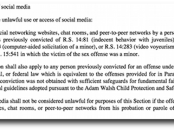Technology and the Law
Examining the intersection of technology and the law, particularly focusing on the legal implications of technological developments.
The more things change, the more they stay the same. People go to work, they go to school, and they go home. Every day. The Industrial Revolution gave us factories, Henry Ford gave us the assembly line, and Steve Jobs and Bill Gates are household names. But despite the radical changes Western Civilization has seen, there are some things that technology cannot change. As technology advances, people often laud the positive. It’s cool! It’s sleek! It makes our lives easier,
[...]
Updated January 11, 2014: Facebook has updated its Platform Roadmap and will be ending the controversially-implemented Sponsored Stories, noting in its Roadmap that “sponsored stories will cease to have delivery after April 9th.” Updated August 29, 2013: Judge Richard Seeborg approved a final settlement of the Fraley case discussed below. Facebook users joining the class action were awarded $15 (pdf) per claimant. The Facebook “like” feature allows users to show that they
[...]
Imagine reading “convicted sex offender” on an individual’s Facebook or LinkedIn page. Such social media websites may need to add a new field to users’ profiles because on August 1, Louisiana will become the first state to require convicted sex offenders to openly list their status on social networking pages. The Louisiana law was signed into law in May 2012 and mandates that sex offenders and child predators “shall include in his profile for the networking website an indication
[...]
In June, the Supreme Court decided a First Amendment case without touching the First Amendment. In fact, they decided the case largely on issues that were merely grazed over during oral argument and in the submitted briefs (where have we heard that before?) – due process and fair notice. Justice Anthony Kennedy, writing for the seven-justice majority, stated, “[a] fundamental principle in our legal system is that laws which regulate persons or entities must give fair notice of conduct
[...]
“Hey! Look up in the sky! It’s a bird! It’s a plane! It’s Superman!” No, it is not Superman, and it is not fighting for “truth, justice, and the American way.” It is a domestic unmanned aerial surveillance aircraft, commonly referred to as a “drone.” Earlier this year, the U.S. Congress paved the way for the domestic use of unmanned drones by federal, state, and local law enforcement agencies as well as by civilians. The
[...]
In today’s market, a sizable portion of the population neither has access to nor cannot afford full legal representation. Limited scope representation, or unbundled legal services, can be an attractive option to both an attorney and a client. Unbundled legal services are more limited in scope, and are presented to the client as a “menu” from which the client can choose. In other words, the client decides how much he or she will do themselves and how much the attorney will be
[...]
iPhones, Androids, Blackberries, and digital cameras – what do they have in common? They all have the potential to turn a routine traffic stop into the next big news story. But do ordinary citizens have the right to record police officers during routine stops and other citizen-officer interactions? According to the U.S. Department of Justice, and several Circuit Courts – Yes! Jonathon Smith, the Chief of the Special Litigation Section of the Justice Department’s Civil Rights
[...]
“Can you hear me now? Good!” is perhaps one of the most recognizable quotes from a Verizon Wireless television commercial which advertises the extent and reliability of its cell phone coverage, but cell phone companies are providing more than just reliable service for their customers nationwide. Local law enforcement agencies (LEA) around the country have been using cell phone tracking as a routine tool in criminal investigations without first obtaining search warrants based on
[...]
The Facebook “like” feature allows users to click a thumbs up icon attached to posts, pictures, links, and pages. By clicking this “like” button, users can “like” pages of companies, political candidates and even candidates in a cutest baby contest. But is a Facebook “like” an expression of liking or supporting something? On April 24, in Bland v. Roberts, Judge Raymond Jackson of the United States District Court for the Eastern District of Virginia ruled “merely
[...]
One social networking site, Pinterest, allows its users to share photos of Do-It-Yourself crafts and the like. These photos are then “pinned” by other Pinterest account holders to their personal virtual bulletin board for all to see and “re-pin.” In February 2012, Business Insider featured an article about attorney Kirsten Kowalski who deleted her Pinterest account after digging into the site’s Terms of Use. Shortly after Kowalski deleted her account, popular blogs
[...]
With each new generation of the iPhone or the release of a new Android application, the capabilities of cell phones and the information they can store increase exponentially. In a time of ever-growing technology and intense competition for a piece of the market share, even the “dumbest” of smartphones may contain an array of personal, often private, information. And although tech-savvy users may think information on cell phones is safe from police searches, changes are coming in areas
[...]
In 1977, the United States Supreme Court in Bates v. Arizona State Bar held lawyers have a right to advertise their services. However, this right is subject to additional rules and regulations. In North Carolina legal advertisements must conform to the North Carolina State Bar’s Rules of Professional Conduct 7.1 through 7.5. The nature of advertising is changing though. The State Bar confirmed in Formal Ethics Opinion 10 in October 2011 that in addition to traditional forms of
[...]
Protect your password. Don’t share it with anyone. Make it complicated so no one can guess it randomly. We do these things because our passwords safeguard our financial and personal worlds. We have passwords for our bank accounts, email, smart phones, and computers. We even have passwords for the hard drives in our computers in case the computer gets lost or stolen. These passwords can protect our personal information or conceal evidence of criminal activity. It is that second
[...]
«
1
…
7
8
9












